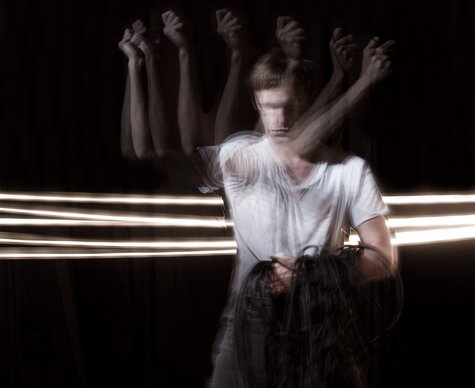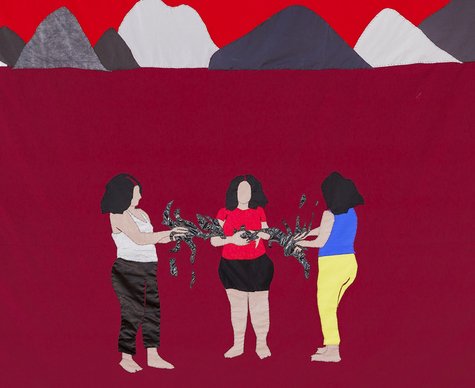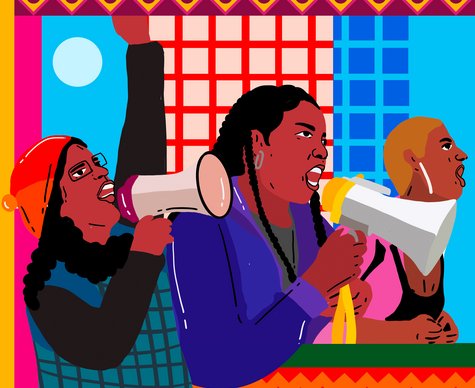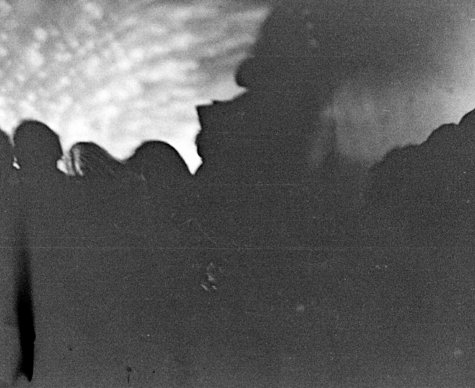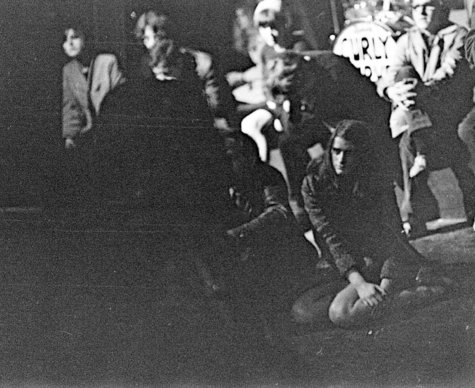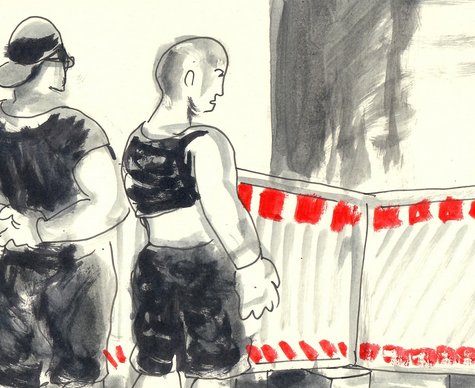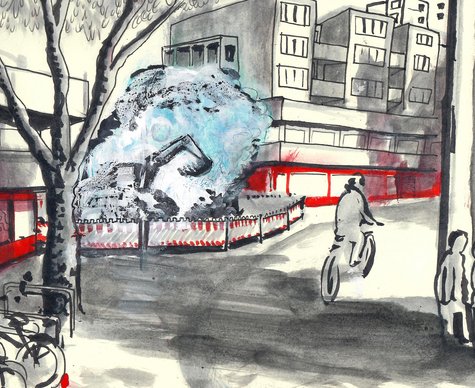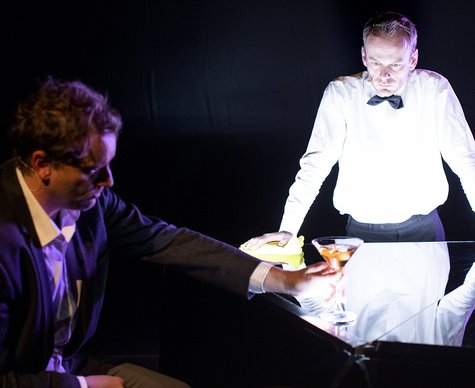3hd 2023: Let Them Eat Cake
Salon de Sticks and Stones
Mit Alex Quicho, Arvida Byström, Monilola Olayemi Ilupeju, Vika Kirchenbauer, Shaunak Mahbubani, Saint Precious, Steph Kretowicz
- Dialogue
- Performance
The power of words should never be underestimated, its potency having been asserted repeatedly throughout history—particularly in the late 18th century. It was during this period of political upheaval that the rousing oration of Toussaint Louverture led to successful Haitian revolution, the very First Amendment ensuring freedom of speech was added to the United States Constitution, and the influential woman-hosted salons of France’s “age of conversation” harbored such radical ideas as the deposition of the country’s own monarchy. 3hd’s “Salon de Sticks and Stones” looks to harness this transformative tool for thought and ultimate action, expanding on this year’s “Let Them Eat Cake” festival edition and its focus on ideas around power and exploitation, consumption and production, in an era of extreme wealth disparity.
“Salon de Sticks and Stones” takes its umbrella title, not only from the famed French discussion groups of the Enlightenment, but an abbreviation of the oft-recited English-language children's rhyme that proclaims “words shall never hurt me.” Problematizing the notion that language is harmless, the Creamcake-hosted discursive program includes a lecture by artist and writer Alex Quicho, and two panels—moderated by writer, editor, and journalist Steph Kretowicz—which are themselves named after other popular and enduring idioms that each connote a generally-accepted truism that might not be so true after all.
Programme
15:00–16:00
The Devil You Know: Knowledge Production and Power after the Enlightenment
With Anna Hankings-Evans, Shaunak Mahbubani, Vika Kirchenbauer
Moderation: by Steph Kretowicz
Otherwise known as the Age of Reason, the ideas of the French-led Enlightenment era of the 17th and 18th centuries still resonate to this day. The cosmopolitan intellectual and cultural movement’s emphasis on secularism, human rights, and separation of powers, continue to inform the world’s constitutional democracies, while the roles of rationality and experience (arguably) persist in taking precedence over tradition, religious belief, or emotion.
But what applies to one nation does not necessarily apply to another. As the Enlightenment thinkers’ confidence in humanity's sense of right and wrong was being undermined by the revolutionary Reign of Terror in the late-18th century, the covert practice of vodou in St. Domingue was instrumental in leading Haiti’s enslaved population to emancipation from colonial France. At the same time, major individual rights advocate and “Founding Father” Thomas Jefferson feared the spread of slave revolt (and thus the equality for which he argued) to the United States.
Thus, the implication of the abiding proverb “better the devil you know than the devil you don’t” is twofold. It not only acts to maintain an inadequate and unjust status quo—mostly likely established by a ruling power in a given society—but the phrasing of the idiomatic expression reveals a fundamental politics of demonization worth interrogating.
16:30–17:00
Alex Quicho: “Girlstack”
Lecture
Alex Quicho presents a lecture that draws on ongoing research from her “Girlstack” Substack platform. Investigating the conceptual model of the “girl” online, the artist and writer argues for this machinic entity as being a technology of subjectivity composed of symbolic, consumer, and inhuman elements. First published as an essay on Wired, called “Everyone Is a Girl Online,” the presentation addresses forced feminization of technology discourse.
“Haters will say that the girl has no access to individual agency and political autonomy, and is therefore an enemy of serious activism—or seriousness, at all. Lovers will reply that the girl is simply emptied of traditional humanist traits to make room for something else.”
3D artist and graphic designer Şiir Biçer’s visuals accompany “Girlstack”, which explores the relationship between subject (girl) and environment (gothic), and the fantasy/horror that constantly circulates between both. The “girl” inhabits no one person, body, or gender. The “girlstack” models the ultrasmooth, cybergothic, and angelic dimensions of the girl’s natural habitat. She might be our only way out of the platform trap.
17:30–18:30
Ugly as Sin: Beauty, Morality, and the Politics of Prettiness
With Alex Quicho, Arvida Byström, Monilola Olayemi Ilupeju
Moderation: Steph Kretowicz
Replacing the 18th-century idiom of “ugly as the devil” and commonly used to describe something as physically or spiritually hideous, the simile of “ugly as sin” was first recorded in 1801, but its associations have existed for far longer than the turn of the 19th century. The equivalence of wickedness with monstrosity, goodness with attractiveness can at least be traced back to early Christian characterizations of pagan gods as frightful and illegitimate, medieval depictions of corrupting female lust carved into churches as architectural grotesques, and Protestant praise for “the beauty of holiness.”
So deeply rooted are the cultural and artistic, historical and political links between beauty and morality in Western society, they’ve not only shaped our understanding of taste and aesthetics but they reveal the deeply held prejudices—crossing gender, race, sexuality, ability—that these values support. As French sociologist Pierre Bourdieu argues in his infamous Distinction: A Social Critique of the Judgement of Taste, the Kantian concept of “aesthetic judgment” serves to reproduce class structure through norms defined, imposed, and endorsed by a dominant group, at the expense of anything else. “Taste is first and foremost distaste, disgust, and visceral intolerance of the taste of others,” he writes, which begs the question, “is the devil ugly, or does the devil wear Prada?”
Afterwards:
Saint Precious
Dates
Credits
Curation and organization: Creamcake. In collaboration with: HAU Hebbel am Ufer. Funded by: Berlin Senate Department for Culture and Social Cohesion.
Location
HAU2
Hallesches Ufer 34, 10963 BerlinThere are two marked parking spots in front of the building. Barrier-free restroom facilities are available. Four relaxed seats are available in the first row of HAU2.
